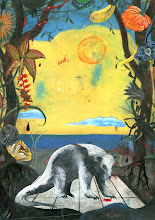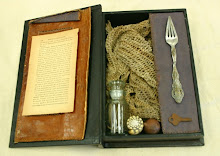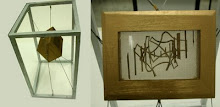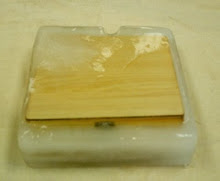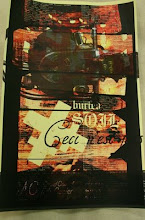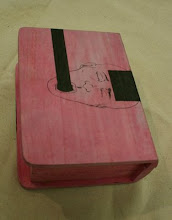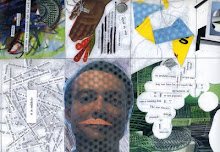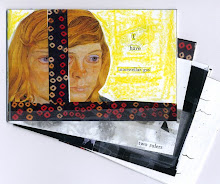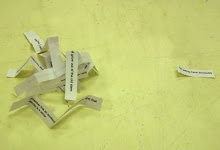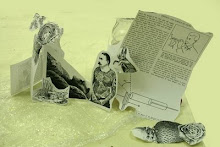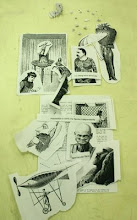I read this poem at the beginning of class this morning.
VVP: Art 434 & Engl. 410
- Dan Callis and Chris Davidson
- Website for Vision Voice and Practice: An Interdisciplinary Course in Art and Creative Writing
Thursday, February 20, 2014
Thursday, February 13, 2014
Spot Collaboration - Textual Artifact
 |
| Standing and Working |
I put these responses aside and then read aloud some list-laden texts: stanzas five & six of Marianne Moore's "The Steeple-jack"; Joshua 18:21-28; George Herbert's poem "Prayer [I]"; and part of chapter 4 of The Great Gatsby. I also played "I Am a Grocery Bag," by They Might Be Giants. [As I'm writing this, I'm thinking of many other possibilities I could have shared.]
 |
| Mostly Sitting and Working |
~
Daniel & Ashley
poor little guy, carrying the human load
carrying distance
lost wet poverty
helpless
white and brown
specimen
ugly depending on who you are talking to
uncomfortable clutter
the masses scare me
always avoid direct eye contact
fuzzy fog
gapping
tunnel
dim
loose
unrequited love
you were great in holes
khaki-colored minerals
you are dangerous
I miss you
demolish
vast
unexpected
inconvenient
trivial
creation commodifed.
- Katelyn Seitz, Reina Berumem, Lauren Higgins
~
anteater tranquility
anteater
tranquility
baby face
surgery
gold bricks
LA looks
yacht club
Tyra Banks
Ghengis Khan
expectation
mass production
novicaine
anteater tranquility
Pinocchio's revenge
blockbuster
roid rage
cheeseball
muscle skunk
mall of America
the underworld
the zebra and the pea
I need anteater tranquility
- Stevi Daniels, Gaven Heim, Aaron Young Smith
~
Krista had just arrived in the
Newark airport for her first trip to America.
Her cousin Diane picked her up at the terminal in her red Volvo.
To her sister’s question, “What do
you think of America so far?” Krista replied:
“Well…
There’s a high possibility I could die here! Rite Aid, shinsplints, police tape, sticky
hands, sad Shia, desert climate, my lost shaker of salt, mountains on stilts,
No! No! No! No!”
“Wonderful,”
said Diane. “Did you buy anything in the
airport?”
“Well…
It’s a good place to catch a disease: trenchcoats, humanity,
glistening sweat! ‘Where is your extra
large undergarment section?’ ‘Give me that blender!’ ‘Meep meep!’ ‘I’m fast,
I’m not slow!’ headlights, hair gel, frosted tips, Spaghetti Western, clay,
‘Mom I wanna go home now!’”
“Superb,”
said Diane. “What do you want to see
while you’re in America?”
“Well…
Jingle All the Way, beans, yo-yos, 90s-era Justin
Timberlake, the south, San Andreas fault, trapezoid, caverns like a cylinder,
luxury fur, Shrek 2, the tower of Babel, a pile of bricks, bricks, high winds,
tourists and time travel, Molehill Mountain, the only survivor (he knew how to
swim!), suntans, javelina!”
“Oh wow,”
said Diane. “Your English has improved
so much! Have you been practicing any
other phrases?”
“Well…
Hi doctor, you should numb me up! Your teeth are so clean, why are you at a
dentist? Hell yeah they’re fake! My legs hurt!
Look at these beautiful shapes I can make! Even the whites of his eyes were sorry! Where are you, Mom? P. Sherman 42 Wallaby Way Sydney! Tumbleweed
icing! Ukraine cinderblocks! Checkerboard bushes! Expensive armpit doesn’t seem real! Ants are for kids! White-white!
Godzilla!!!”
“Mmhmm,”
said Diane.
- Joshua Patch, Nico Hernandez, Lit Odom
~
Walking majestic through the fog,
Leading down into the abyss,
Magnum opus of fallen angels,
Judged by God, pigs in a pen,
impaled--"ouch"
Time freeze
Too bad they don't die.
Black Friday; all clothes match on
The Road to Hell;
A dark chasm leading down;
Conglomerations of tourists,
Manipulated; packs on their backs;
Sexy dentists; youth and beauty
Brigade; children screaming
I transform! I transform!
Love rejects no environment.
Who are you? The travel agency told me: Super Human;
Christ's aura; "God"; I look so
Good running the path to the bottom.
Judgment has no security guards.
- Kent Reister, Jake Anderson, Josué Luna
~
next to hell
falling saint, deep and unknown power, ancient worshipers,
diverse wreckage, hungry people, precarious king, blue suns,
bristled aliens, dark desert towers; colonnade of korah, stacked
with light,
long journey's end
- Katherine Baker, Alison Evans, Daniel Larsen
~
Is that a Dragon?
Awe and terror
A majestic contrast--white and dark
Warmth in winter
Orange hue; blue saturation
Pearly whites in the dirt.
Fearful paradise. Gold.
Stubborn glamor
Rugged beauty, looks unreal
Crisp eyes. Edges-depth
Perfectly science fiction.
We wonder.
- Victoria Van Vlear, Alyssa Martin, Nicole Rinde
~
Florida Keys
summer in the South
sparse grass, cool sun
pools of sunny water
reflections ripple
sad, sad child actor
White teeth, clear eyes
tan sweaty face
contrast strength & health
corny, posed, gloss
long-faced with doe eyes
light & dark, rich & nutty--the middle ground
bottomless broken layers
A little too pleading
a little too shallow
no one knew
can't get full
but still that stare;
L.A. is dying & no one cares
he was hella-pissed
carrying all his worldly possessions on his back
- Olivia Hays, Jeanne Halstead, Allison Winters
~
Just do it.
Pull.
Tug.
Taste the deep dark buried in the dirt, scratchy lava rocks
Paint the very roots of the Earth a new foggy yellow
Teeter Topple up and down
The sirens are going off!
Descend extending angles
Due of starvation in a bottomless pit.
Look mid-stride ahead through desert and waste.
I can see my childhood from here!
Swallow.
Fear.
Catch.
Melt,
Mask,
Saudi Arabia is a bad place to get a divorce
False while galore shining but with what?
Globalism, materialism, 50% off all Christmas decorations.
Made worse by pretense of perfection.
Hit me with your
Vacant almost smile
And glimmering eyes so welled up with moisture.
Open your mouth and say "That'd be noisy."
Imprecise snuffling, smelling for a friend
Flash.
Paint.
Step.
Rise.
Carve.
Slide.
Leave the penny
Warm the ears listening thing
Jurassic light caught reflection to walk on
Standing alive but only visually.
How'd you get here?
- Connor Collins, Nathan Fan, Lori Lusk
~
My neighbors are
blank face:
screaming squares,
sniveling chess pieces in
Satan's crawl space.
They're roadtrip camping,
cookie crumble cocain consumers,
trudging along and left tethered.
Mary: fake spray tan--
caught in the act with
Peter; hunger and crouch.
Joseph, trying not to smile and
acting all grown up:
sunshine hair, garbage make up--
lines up unrequited love and enjoys it too much.
Rats in draw pipes dig
beyond the reach of human arms,
pretentious but lost and narrow.
These are modeling ancient people.
- Brooke Dodson, Michael Asmus, Lisl Ruckert
Friday, February 7, 2014
Annie Dillard, Seeing, & Light Pollution
Yesterday, we discussed "Seeing," a chapter from Annie Dillard's Pilgrim at Tinker Creek. The main premise is that it requires patience and attention to discover those wonders around us. (It sounds banal put this way. She writes it much better than this.) Here's Dillard describing an evening one August when she stayed out in the woods "too late":
But shadows spread, and deepened, and stayed. After thousands of years we're still strangers to darkness, fearful aliens in an enemy camp with our arms crossed over our chests. I stirred. A land turtle on the bank, startled, hissed the air from its lungs and withdrew into its shell. An uneasy pink here, an unfathomable blue there, gave great suggestion of lurking beings. Things were going on. I couldn't see whether that sere rustle I heard was a distant rattlesnake, slit-eyed, or a nearby sparrow kicking in the dry flood debris slung at the foot of a willow. Tremendous action roiled the water everywhere I looked, big action, inexplicable. A tremor welled up beside a gaping muskrat burrow in the bank and I caught my breath, but no muskrat appeared. The ripples continued to fan upstream with a steady, powerful thrust. Night was knitting over my face an eyeless mask, and I still sat transfixed.Later, she writes, "Darkness appalls and light dazzles; the scrap of visible light that doesn't hurt my eyes hurts my brain. What I see sets me swaying. Size and distance and the sudden swelling of meanings confuse me, bowl me over." This "bowling over" is caused not just by being open to what's around us, when we're in the 'natural' world, but what's our normal state: Artificial light, and lots of it, something our biology is not entirely equipped to engage:
“The eye adapts to the brightest thing in sight,” he said. “When you have glare, the eye adapts to the glare, but then you can’t see anything darker.” The human retina contains two kinds of photoreceptors—cones, which react quickly to fine details and colors, and rods, which, though slower and bad at colors, are far more numerous and many times more sensitive to light. It’s mainly the rods that enable us to see at night, and they are so sensitive that they can take up to an hour to recover their full function after exposure to a light source no brighter than a desk lamp. Deer, which have an even higher proportion of rods to cones, have excellent nighttime vision but appear extremely vulnerable to temporary blinding by bright light—perhaps a reason that they have difficulty in getting out of the way of cars on dark roads. People may experience a similar phenomenon driving away from a highly illuminated outdoor area, such as a gas station with an intensely bright canopy.That passage comes from an article by David Owen called "The Dark Side: Making War on Light Pollution." The whole thing is worth reading, but the main point has thrummed in me lo these six years since it was first published:
To see skies truly comparable to those which Galileo knew, you would have to travel to such places as the Australian outback and the mountains of Peru. And civilization’s assault on the stars has consequences far beyond its impact on astronomers. Excessive, poorly designed outdoor lighting wastes electricity, imperils human health and safety, disturbs natural habitats, and, increasingly, deprives many of us of a direct relationship with the nighttime sky, which throughout human history has been a powerful source of reflection, inspiration, discovery, and plain old jaw-dropping wonder.
in-class 'spot' collaboration text and image
We did another in-class 'spot' collaboration giving the student groups a page of text and several pages of image. They had twenty-five minutes to make a thing from these materials. The thing had to include both text and image.
Here are a few examples of what the groups made.
Here are a few examples of what the groups made.
Collaboration
Collaboration is working with each other to do a task and to achieve shared goals. It is a process where two or more people work together negotiating convergent goals, (this is more than the intersection of common goals seen in co-operative ventures, but a potentially deep, collective, determination to reach an expansive objective - for example, an endeavor that is creative in nature - by sharing knowledge, learning and building consensus. Most collaboration requires leadership, although the form of leadership can be social within a decentralized and egalitarian group. In particular, teams that work collaboratively can obtain greater resources, recognition and reward when facing competition for finite resources.
“…it’s interesting
that in Silicon Valley “collaboration” is defined as something you do with
another colleague or company to achieve greatness — something to be praised —
as in: “They collaborated on that beautiful piece of software.” But in Congress
“collaboration” means something very different today. It’s the second
definition — collaboration is an act of treason — something you do when you cross over and vote
with the other party. In
Silicon Valley, great “collaborators” are prized; in Washington, they are
hanged. Said Cohen, who was vice president at Nicira, a networking start-up
that recently sold for $1.26 billion: “In Washington, when they say
‘collaborator’ they mean ‘traitor’; here they mean ‘colleague.’
Editorial piece by Thomas Friedman, New York Times
in-class 'spot' collaboration - text
We had our first in-class 'spot' collaboration. We divided the class into small groups, gave them a single sheet of text and told them they had 20 minutes to create an object using the text.
Here's a sampling of what they produced.
Here's a sampling of what they produced.
Tuesday, February 4, 2014
Genre-mash!
The images of this project are pretty literal-minded, but that's made up by a healthy sense of fun.
More from the project here.
More from the project here.
The "Saved Project"
Last Spring, poet Lorene Delany-Ullman visited our class, in part to tell us about a collaborative project she was working on with photographer Jody Servon. The project, called Saved, "is an ongoing series of photographs and prose poems of objects saved after the death of a loved one," and it has made its West Coast premiere in the Art Center Building at Orange Coast College, on exhibit through March 3rd. Lorene will give a reading at a reception there on Thursday evening, February 20th. More information about the event can be found here.
Subscribe to:
Comments (Atom)






.jpg)


































































